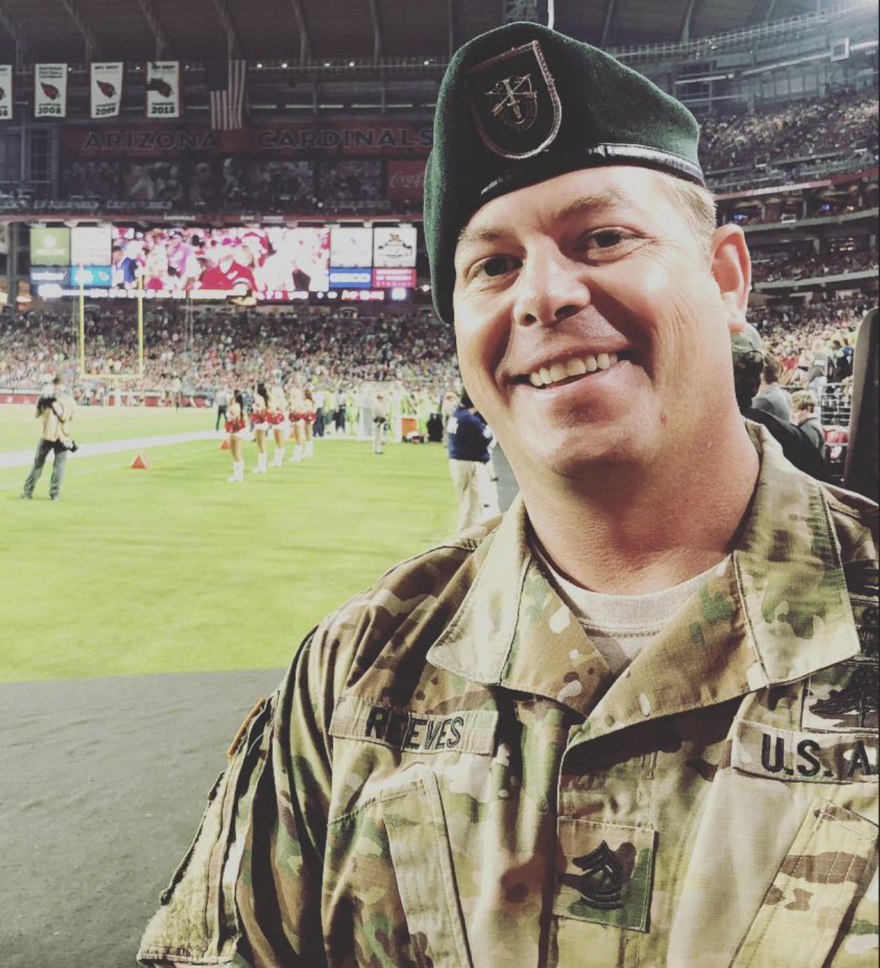Editor’s Note: This story discusses thoughts of suicide, which some readers may find disturbing.
Ryan Reeves spent 22 years in the Army. He retired as a Green Beret four years ago. Now he talks with other veterans about their traumas on a podcast he hosts called Team Trek.
“But really, how they're getting through the trauma is, ‘Why are you still here and why haven't you put a gun in your mouth?’”
Reeves said the conversations are therapeutic.
If You Need Help
If you or someone you know is experiencing thoughts of suicide, help is available 24 hours a day. Call the Suicide Prevention Lifeline at 988 or go here for online chat.
For more help:
- Find 5 Action Steps for helping someone who may be suicidal, from the National Suicide Prevention Lifeline.
- Six questions to ask to help assess the severity of someone's suicide risk, from the Columbia Lighthouse Project.
- To prevent a future crisis, here's how to help someone make a safety plan.
In one episode, fellow veteran Martin Acosta introduced him to the idea of using the hallucinogen ibogaine to treat PTSD. Ibogaine is extracted from the root bark of the iboga tree, a Central African shrub that’s been used in shamanistic rituals for centuries. Some researchers believe it has potential to help with addiction, PTSD, and traumatic brain injuries.
“It’s a different point of view of attacking the problem that that we all know exists which is mental health and and suicide,” Acosta said.
But it is illegal in the United States, and some military veterans and others are traveling abroad to get it.
Acosta was able to access the drug at a clinic in Mexico where it’s unregulated.
“So this psychedelic space, it's is definitely another tool set for us to use,” Acosta explained. ”The journey there was not easy, but … there's light at the end of the tunnel.”
Reeves says he’s tried various approaches to manage his anxiety, depression, and night terrors, including medication, alcohol, and marijuana. But most only provided temporary relief.
This month Reeves took a flight from Florida to San Diego.
“So I am here on a mission, a personal mission, to try to do some self recovery,” Reeves said.
He met up with five others — some vets, some not — from different parts of the country. Nervous yet hopeful, they climbed into vans headed to a retreat center in Tijuana.
“If I can get that opportunity to deal with, with some of those past things, reset my emotions and really just get that second chance, that second chapter of life starting, starting fresh. That's what I'm hoping for. I know that's a large order. So really, I'm just hoping to get a little bit further and find a reason to stay around,” Reeves said.

Amber Capone is co-founder of the San Diego nonprofit VETS, which is paying for most of his treatment. They help veterans access psychedelic-assisted therapies.
“By the end of this year, or early 2025, we will have provided our 1,000th veteran with a full subsidy to seek treatment,” Capone said.
Capone wants ibogaine removed from the federal government’s list of Schedule 1 controlled substances. She says the options for veterans fall short.
“Veterans who are willing to die for our country have to leave its borders for access to meaningful care,” she said.
Her experience with the problem is personal. “My husband was on a pharmaceutical carousel for a number of years, where one prescription prompted the need for another prescription to offset side effects and negative ... symptoms from the first one, and it became this roller coaster of insanity, and so many veterans are currently trapped on that,” Capone said.
Stanford Medicine researchers studied 30 Special Operations veterans treated with ibogaine at Ambio Life Sciences in Tijuana. One month after treatment, they found participants experienced an 85% reduction in PTSD, depression, and anxiety symptoms on average.
Sarah Simmons, director of psychological wellness at Kaiser, said ibogaine holds a great deal of promise, but it also poses some risk. She said ibogaine can affect the heart's rhythm — so continuous cardiac supervision is important during treatment.
“I think it's very important that if somebody is considering something like this, that they speak with their primary care doctor, they speak with their psychiatrist first so that they can make an informed decision and be aware of any risks that are involved,” she said.
The treatment is expensive. It ranges from $4,000 to $8,000 for a five-day stay. The clinic operates like a pop-up luxury retreat. It’s held in a beachfront home about five miles south of the U.S.-Mexico border.
Trevor Millar greets the group. He opened Ambio Life Sciences three years ago. He operated a similar clinic in Canada where ibogaine can be prescribed.
“I think we've treated close to, if not slightly over, about 1,500 people in that time. Mostly veterans, all completely safe,” he said.
It’s staffed with nurses, paramedics, and chefs. Psychedelic integration coaches guide participants through what they call an "ibogaine experience."
“We've got all the medical equipment required. We've got all the medical staff that understands the medicine,” Millar said.
It’s been about three weeks since Reeves' treatment. He’s back home in Florida.
“I started seeing images of heads passing by, faces, nobody recognizable. Everybody, for the most part, you know, looked pretty friendly,” Reeves said, who took four pills of the drug, but purged two.
Reeves says ibogaine gave him newfound clarity and patience. When he got home, he had to say goodbye to his English bulldog Bruno. “I would have been a wreck had I not just gone through what I did.”
Since returning home, he says he hasn’t had any thoughts of harming himself.
“It hasn’t even been a thought. Like it hasn't even occurred to me.”
He plans to share his experience with ibogaine on the podcast.
“We all know that it's not a silver bullet. There's not one that exists out there that's just going to fix you. But this is a tool, and what I'm doing with the podcast is really just trying to illuminate these tools that are out there,” he said. "To provide options to these guys so they don't feel like, first of all, they’re alone in their feelings, and second, like there's no way to go but suicide. So that’s really the hope with all of this.”





